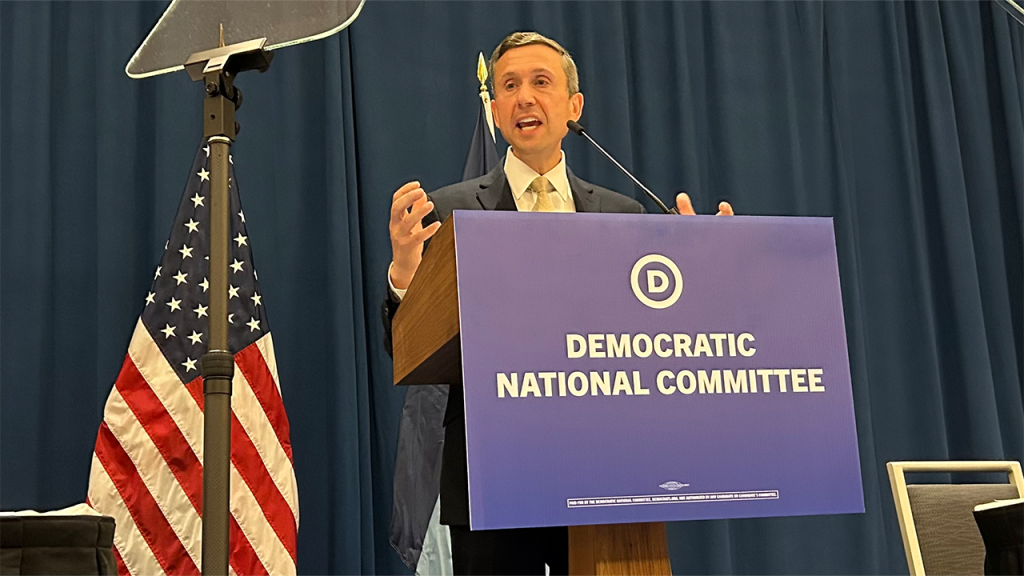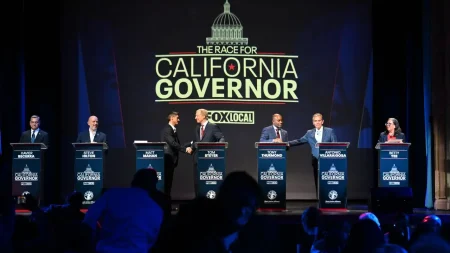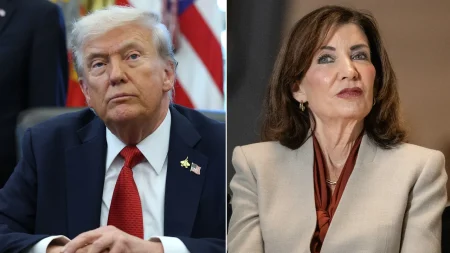Democrats Unite Against Trump Amid Internal Divides at Summer Meeting
In Minneapolis on Monday, the Democratic National Committee (DNC) kicked off its summer meeting with a rallying cry for unity against former President Donald Trump, even as significant internal divisions threatened to surface. “We are unified towards one single goal: to stop Donald Trump and put this country back on track,” declared DNC Chair Ken Martin as he addressed more than 400 elected party officials from across the nation. The gathering represents a critical moment for Democrats as they attempt to regroup after losing control of both the White House and Senate in the 2023 elections, while also failing to reclaim the House majority.
Despite the outward display of unity in their opposition to Trump’s controversial actions during his first seven months back in office, serious divisions within the party were expected to emerge during Tuesday’s Resolutions Committee meeting. Two particularly contentious issues stood poised to dominate the discussions: the ongoing war in Gaza between Israel and Hamas, and the role of “dark money” in presidential politics. Competing symbolic resolutions on Gaza reflect the fracturing of the Democratic Party’s traditionally solid support for Israel. The conflict, sparked by Hamas’s October 7, 2023 attack that killed nearly 1,200 Israelis and took over 250 hostages, has resulted in more than 60,000 Palestinian deaths during Israel’s military response. One resolution, backed by Martin, calls for a ceasefire, while a competing measure demands an arms embargo and suspension of U.S. military aid to Israel—reflecting the growing concerns among the party’s progressive base over the humanitarian crisis in Gaza.
Additionally, Martin is pushing for a resolution affirming the DNC’s commitment to “eliminating unlimited corporate and dark money in our presidential nominating process beginning in the current 2028 cycle.” This proposal calls for the creation of a panel to recommend “real, enforceable steps” to eliminate such funding from the 2028 primary process. While Democrats have long criticized the outsized influence of money in politics, this represents a concrete attempt to address the multiplication of super PACs and other outside groups that can accept unlimited contributions. The resolution signals the party’s recognition that its messaging on campaign finance reform needs to be matched with actual policy changes within its own processes.
The gathering in Minnesota comes at a challenging time for Democrats. The party’s brand has reached historic lows in national polling, with particular weakness among younger voters who have traditionally been reliable Democratic supporters. Financial challenges compound these problems, with the DNC facing a significant fundraising deficit compared to the Republican National Committee. Voter registration data shows Democratic Party enrollment declining in the 30 states that register voters by party, while Republican sign-ups are increasing. These trends suggest structural problems that go beyond mere messaging issues and point to a potential realignment among key demographic groups that previously formed the bedrock of Democratic support.
Despite these challenges, party leaders at the meeting were quick to downplay reports of division and emphasize the importance of unity in the face of what they describe as existential threats. Minnesota Governor Tim Walz addressed the committee members with a pragmatic perspective, noting that “there’s a division in my damn house, and we’re still married, and things are good. That’s life… We are strong because we challenge each other.” Similarly, longtime Democratic strategist and DNC committee member Maria Cardona expressed frustration with media focus on internal disagreements, telling Fox News, “I’m so sick of people focusing on the infighting and the circular firing squad. All of that is crap, when we have real issues, existential threats that we need to fight about, and we are all united on that front and that’s all that matters.”
For Martin, who was elected DNC chair just months ago in February, the summer meeting represents both a challenge and an opportunity. His tenure has already been marked by controversy, including when former vice chair David Hogg endorsed primary challengers against established House Democrats in safe blue districts. Republicans have been quick to capitalize on the Democrats’ struggles, with RNC communications director Zach Parkinson noting that “under Ken Martin’s leadership, Democrats have sunk to their lowest approval rating in 35 years.” In a pointed jab, Parkinson added that “as Republicans, we think he is doing a fantastic job, and we fully endorse him to stay on as DNC Chair.” As the summer meeting continues, Democrats face the delicate task of addressing their internal divisions while presenting a unified front against Trump and the Republican agenda—a balance that will likely determine their electoral fortunes in the coming years.













